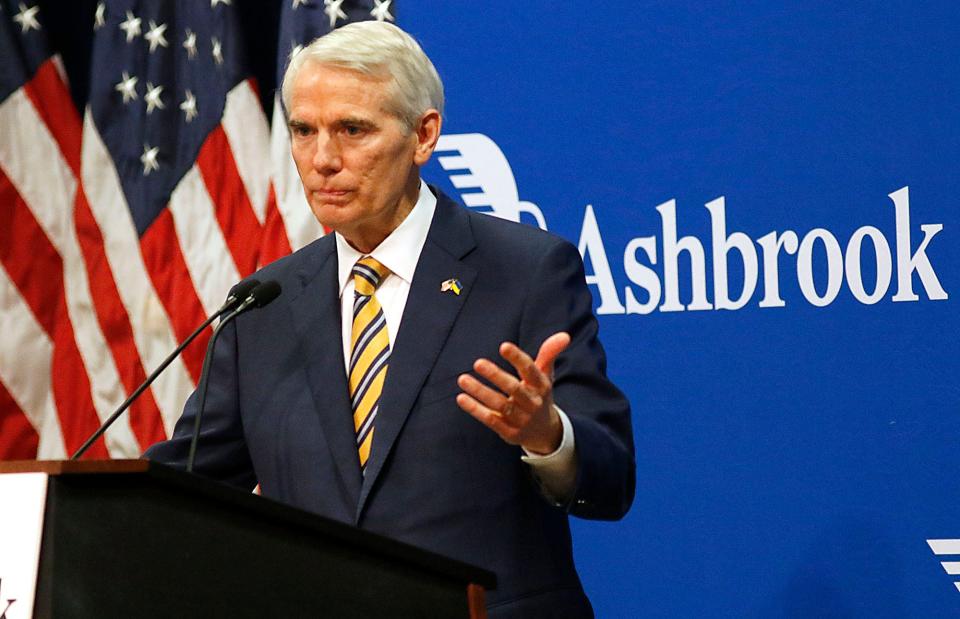Faint interest in candidate endorsement by Sen. Rob Portman shows how Ohio GOP is changing
- Oops!Something went wrong.Please try again later.
- Oops!Something went wrong.Please try again later.
- Oops!Something went wrong.Please try again later.
- Oops!Something went wrong.Please try again later.
- Oops!Something went wrong.Please try again later.
What happened to Rob Portman? The Cincinnati Republican faded as the recent primary election approached.
To a degree, that is not surprising. Portman chose not to seek a third term in the U.S. Senate. He is the past, the race about now and the future. Yet, in a crowded field, the word of the incumbent, especially one as experienced and skilled as Portman, would seem to carry clout in arriving at a winner.
Portman gave his backing to Jane Timken, a former chairwoman of the Ohio Republican Party. She finished fifth in a field of seven, collecting just 62,000 votes out of 1 million cast. Toward the end of the campaign, analysts indicated Timken supporters may have moved to Matt Dolan, a state senator representing parts of Cuyahoga County, in hope of a moderate candidate capturing the nomination.
Dolan received 23% of the vote.
Of course, J.D. Vance, author, venture capitalist and commentator, proved the victor, with 32%, aided, as operatives agreed, by the endorsement of Donald Trump, the championing of Tucker Carlson and the big PAC money of Peter Thiel, a Silicon Valley tycoon. Still, the Vance win is part of something larger, roughly three-quarters of the vote going to candidates chasing the embrace of Trump, and that includes Timken.
The result rates as a milestone, in the small percentage for Dolan and the puny role of the Portman endorsement. Add the outcome in the Republican race for governor. Mike DeWine won easily. Yet a narrow majority, spread over three candidates, wanted to see the incumbent toppled for a more conservative, or Trump-like, choice.
Put another way, this isn’t the state Republican Party of George Voinovich, Bob Taft, Betty Montgomery, Jo Ann Davidson and Jim Petro. They all qualify as conservatives. In their public lives, they also had an abiding respect for the difficult, honorable and imperfect craft of governing, from learning the ropes to finding compromise across the aisle.
Voinovich famously touted his eagerness to examine the “bowels” of government. He was saying: Substance matters. Leadership has its component of personality, or performance, part of attracting followers. What Voinovich and others understood is the value in getting the policy right, the direction and the details.
The recent remembrances of William Batchelder, a former House speaker and longtime lawmaker, did not make enough of his early capacity to put partisanship aside to advance the public interest. Batchelder was an arch conservative, among the first “cavemen.” Yet, when the savings and loan crisis landed, he made his legislative expertise available to help the Democratic administration of Richard Celeste respond effectively.
John Kasich seemed a sharp departure when he gained the governor’s office. He overreached with his assault on public-sector collective bargaining. He didn’t get the necessity for patience in the Third Frontier, the research and development program of Bob Taft. Eventually, he grew up, though still abrupt and dismissive. He gained a greater appreciation of the difference government can make. He long has seen through the Trumpian bombast and recognizes the danger.
It is a shame to see Anthony Gonzalez driven from public life because he broke from most in his party and voted to impeach Donald Trump. He is the kind of lawmaker that polls tell us people want — informed, deliberative, principled and open to bridging differences.
In contrast, J.D. Vance prevailed on primary day because he transformed himself from a Trump critic to an echo of the former president. A super PAC ad supporting Vance portrayed the similarly flexible Josh Mandel as “a moderate for the moderates.” The Washington Post Fact Checker recently nabbed Vance for claiming the border policy of the Biden White House amounts to trying to kill Trump supporters through drug overdoses.
Vance said he was “honored” to have the endorsement of provocateur Marjorie Taylor Greene, campaigning with her in the state. He declared: “I don’t really care what happens to Ukraine.” He did so as Rob Portman pressed for additional assistance for Ukrainians as they fight the Russian invasion.
On his webpage, Vance argues in a section labeled “Issues” that “our leaders have failed.” Among other things, they have chosen “to flood our country with criminals and drugs” and “to make a quick buck by selling our industrial base to China.”
The diatribe contains a few hints of policy-making, for example, improving antitrust enforcement. The gist is about performance, feeding imagined wrongs and resentments, offering practically nothing about such matters as climate change, health care and gun violence. Jim Jordan would be comfortable there.
So, there is a suggestion about why so many of our leaders have failed. Like Donald Trump, they aren’t interested in real governing, the campaign of J.D. Vance a long and discouraging way from George Voinovich.
Douglas was the Beacon Journal editorial page editor from 1999 to 2019. He can be reached at mddouglasmm@gmail.com.


This article originally appeared on Akron Beacon Journal: Ohio Republican voters listen to Trump, not Senator Rob Portman

